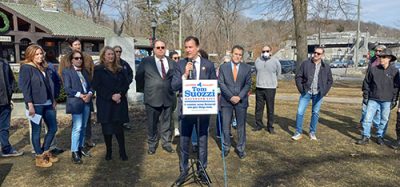Local Officials, Gubernatorial Hopeful Assail Accessory Dwelling Plan
News Article Article pages that do not meet specifications for other Trust Project Type of Work labels and also do not fit within the general news category.

A bipartisan group of Westchester municipal leaders joined congressman and Democratic gubernatorial hopeful Tom Suozzi in Chappaqua Saturday morning to resist two pieces of legislation that they argue would drastically change the character of communities across the state.
Suozzi, along with supervisors Lisa Katz of New Castle, Michael Schiliro of North Castle, Matt Slater of Yorktown, Warren Lucas of North Salem and Mount Kisco Mayor Gina Picinich blasted the Accessory Dwelling Unit (ADU) law and Transit-Oriented Development legislation.
They blasted its inclusion in Gov. Kathy Hochul’s 2023 Fiscal Year budget, contending it would obliterate home rule and jeopardize environmental protections across the state.
“The idea of the state of New York, taking the long arm of the state government, reaching down and taking away local control from local officials, from mayors and town supervisors and local officials, the way it’s been since the founding of New York State, is undemocratic, is inappropriate, undermines local rule and will destroy the quality of life in many neighborhoods,” said Suozzi, a former Nassau County Executive who is planning to force a primary against Hochul.
The ADU law would allow most residential property owners to have an accessory apartment dwelling with many of the traditional local zoning protections relaxed. A Transit Oriented Development law allows for 25 units per acre within a half-mile radius of a train station.
Critics have argued it would overwhelm residential communities with unsustainable density, causing parking headaches in some neighborhoods and potential environmental nightmares.
“This is not about opposing ADUs, it’s not about opposing affordables,” Schiliro said. “This is opposing Albany coming down and telling all of the towns and villages and cities what’s good for them. They don’t know anything about our communities, our sewers, our water. In our town, we’re almost 90 percent septic and well. They don’t know anything about these aquifers, but they know more about our zoning? It doesn’t make sense.”
Local officials pointed out that they have had accessory dwelling unit and/or affordable housing laws on the books for years. In New Castle, Katz said the area near the Chappaqua train station that would be eligible for the 25-unit-per-acre development would severely impact schools, infrastructure, parking and emergency services.
“That means every single single-family housing in this town is in danger, on their one-acre zoning, potentially to have a 25-unit minimum,” Katz said. “So to me, that’s going to cause significant issues.”
Opposition has been gaining momentum locally. After the North Castle Town Board initially approved a resolution strenuously objecting to the ADU legislation on Jan. 26, last week Mount Pleasant, Yorktown and Somers followed suit. Many other municipalities in Westchester and Putnam counties are also soon expected to pass resolutions.
State Sen. Peter Harckham (D-Lewisboro) introduced the ADU legislation last year in the Senate. However, municipal officials became alarmed to learn in January that the legislation had been included in Hochul’s proposed state budget for the next fiscal year.
On Saturday, Harckham didn’t appear to be backing down. Calling Suozzi’s opposition “regrettable” and predicting he’d be “on the wrong side of history,” the senator said tens of thousands of working-class New Yorkers’ search for an affordable place to live is out of reach.
Under his plan, housing stock would be increased while also providing homeowners with an additional revenue stream should they choose to add an accessory unit, he said.
“Sadly, our inability to meet regional housing needs is the result of the strict zoning laws that too many municipalities have enacted, which is why a state plan for ADUs is required,” Harckham said. “I am ready to work collaboratively with anyone to ensure local governments can craft their own ADU laws – that’s in the legislation. But turning the discussion on ADUs away from the need for affordable housing is simply wrong.”
Lucas, who is president of the Westchester-Putnam Association of Town Supervisors, said municipal leaders were scheduled to meet with Harckham on Monday to discuss the legislation.
Meanwhile, the most immediate goal is to convince state officials to remove the laws from the budget, he said. Should the budget be approved with it remaining, then it would become law.
“There’s no legislative process,” Lucas said. “This is policy and it should be debated.”
To address the lack of affordable housing, Suozzi said the state should be offering various incentives. He also stressed his support for the federal Build Back Better initiative that’s stalled in Congress, which would provide the state with billions of dollars for affordable housing.
New Castle Councilman Jeremy Saland, who attended the press conference but was not part of the group of officials denouncing the legislation, agreed the proposals should be removed from the budget and criticized certain portions of it such as a four-foot setback. However, he chastised those for turning Saturday’s press conference into what he described as “a political rally.”
“To say to our state senator, we find this is a deplorable piece of legislation, this is terrible, all these horrible things and then say come and work with us, it doesn’t make sense,” Saland said. “Let’s work together. Just work together.”

Martin has more than 30 years experience covering local news in Westchester and Putnam counties, including a frequent focus on zoning and planning issues. He has been editor-in-chief of The Examiner since its inception in 2007. Read more from Martin’s editor-author bio here. Read Martin’s archived work here: https://www.theexaminernews.com/author/martin-wilbur2007/

